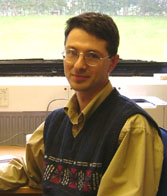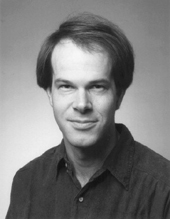Panelist Biographies
Dr. Kim Weaver, NASA HQ Program Scientist and Press Liaison
Dr. Kim Weaver is on temporary assignment at NASA Headquarters as a Program Scientist and the Press Liaison for space science missions within the Universe Division. She began studying astronomy at the University of Maryland and discovered the world of High-Energy Astrophysics as a graduate researcher at NASA's Goddard Space Flight Center. After graduating with a Ph.D., she moved to Penn State University and then to Johns Hopkins University, where she is currently affiliated as an adjunct Associate Professor. In 1996, Dr. Weaver won a NASA Presidential Early Career Award to pursue research in extragalactic astronomy. In 1998, she returned to NASA to continue her career as an x-ray astrophysicist at Goddard Space Flight Center.
Dr Sergei Nayakshin, Lecturer, University of Leicester, United Kingdom
Dr. Sergei Nayakshin is a Lecturer at the Department of Physics and
Astronomy in the University of Leicester, UK. He received his undergraduate
degree in physics from the Moscow Institute of Engineering Physics
(1993), and his Ph.D. in theoretical astrophysics from the University of
Arizona in Tucson in 1998. Prior to joining the University of Leicester,
Dr. Nayakshin was a member of the Max Planck Institute for Astrophysics
in Garching, Germany. Earlier, he was a National Research Council
fellow at the NASA's Goddard Space Flight Center in Greenbelt, Maryland.
His main research interest is the physics of accretion disks in active
galactic nuclei. This includes formation mechanisms of these disks,
their self-gravity and the resulting star formation, and the still
poorly understood link that these disks provide between the supermassive
black holes and the galaxies that host them. In recent years, the wealth
of new exciting data allowed Dr. Nayakshin to test our theoretical
knowledge of accretion disks and star formation in the center of our own
Galaxy.
Dr. E. Sterl Phinney, Professor of Theoretical Astrophysics, California Institute of Technology
E. Sterl Phinney is a professor of theoretical astrophysics at the California Institute of Technology in Pasadena, where he has been on the faculty since 1985. Professor Phinney received his Ph.D. in theoretical astrophysics from Cambridge University (U.K.) in 1983, before going on to the Institute for Advanced Study in Princeton, NJ. His research interests include astrophysical sources of gravitational radiation, the physics of pulsars, and the physics around black holes. Professor Phinney has served on numerous advisory boards and committees, as well as receiving a host of awards and memberships throughout his career.
|
 Dr. Kim Weaver is on temporary assignment at NASA Headquarters as a Program Scientist and the Press Liaison for space science missions within the Universe Division. She began studying astronomy at the University of Maryland and discovered the world of High-Energy Astrophysics as a graduate researcher at NASA's Goddard Space Flight Center. After graduating with a Ph.D., she moved to Penn State University and then to Johns Hopkins University, where she is currently affiliated as an adjunct Associate Professor. In 1996, Dr. Weaver won a NASA Presidential Early Career Award to pursue research in extragalactic astronomy. In 1998, she returned to NASA to continue her career as an x-ray astrophysicist at Goddard Space Flight Center.
Dr. Kim Weaver is on temporary assignment at NASA Headquarters as a Program Scientist and the Press Liaison for space science missions within the Universe Division. She began studying astronomy at the University of Maryland and discovered the world of High-Energy Astrophysics as a graduate researcher at NASA's Goddard Space Flight Center. After graduating with a Ph.D., she moved to Penn State University and then to Johns Hopkins University, where she is currently affiliated as an adjunct Associate Professor. In 1996, Dr. Weaver won a NASA Presidential Early Career Award to pursue research in extragalactic astronomy. In 1998, she returned to NASA to continue her career as an x-ray astrophysicist at Goddard Space Flight Center.
 Dr. Sergei Nayakshin is a Lecturer at the Department of Physics and
Astronomy in the University of Leicester, UK. He received his undergraduate
degree in physics from the Moscow Institute of Engineering Physics
(1993), and his Ph.D. in theoretical astrophysics from the University of
Arizona in Tucson in 1998. Prior to joining the University of Leicester,
Dr. Nayakshin was a member of the Max Planck Institute for Astrophysics
in Garching, Germany. Earlier, he was a National Research Council
fellow at the NASA's Goddard Space Flight Center in Greenbelt, Maryland.
Dr. Sergei Nayakshin is a Lecturer at the Department of Physics and
Astronomy in the University of Leicester, UK. He received his undergraduate
degree in physics from the Moscow Institute of Engineering Physics
(1993), and his Ph.D. in theoretical astrophysics from the University of
Arizona in Tucson in 1998. Prior to joining the University of Leicester,
Dr. Nayakshin was a member of the Max Planck Institute for Astrophysics
in Garching, Germany. Earlier, he was a National Research Council
fellow at the NASA's Goddard Space Flight Center in Greenbelt, Maryland. E. Sterl Phinney is a professor of theoretical astrophysics at the California Institute of Technology in Pasadena, where he has been on the faculty since 1985. Professor Phinney received his Ph.D. in theoretical astrophysics from Cambridge University (U.K.) in 1983, before going on to the Institute for Advanced Study in Princeton, NJ. His research interests include astrophysical sources of gravitational radiation, the physics of pulsars, and the physics around black holes. Professor Phinney has served on numerous advisory boards and committees, as well as receiving a host of awards and memberships throughout his career.
E. Sterl Phinney is a professor of theoretical astrophysics at the California Institute of Technology in Pasadena, where he has been on the faculty since 1985. Professor Phinney received his Ph.D. in theoretical astrophysics from Cambridge University (U.K.) in 1983, before going on to the Institute for Advanced Study in Princeton, NJ. His research interests include astrophysical sources of gravitational radiation, the physics of pulsars, and the physics around black holes. Professor Phinney has served on numerous advisory boards and committees, as well as receiving a host of awards and memberships throughout his career.